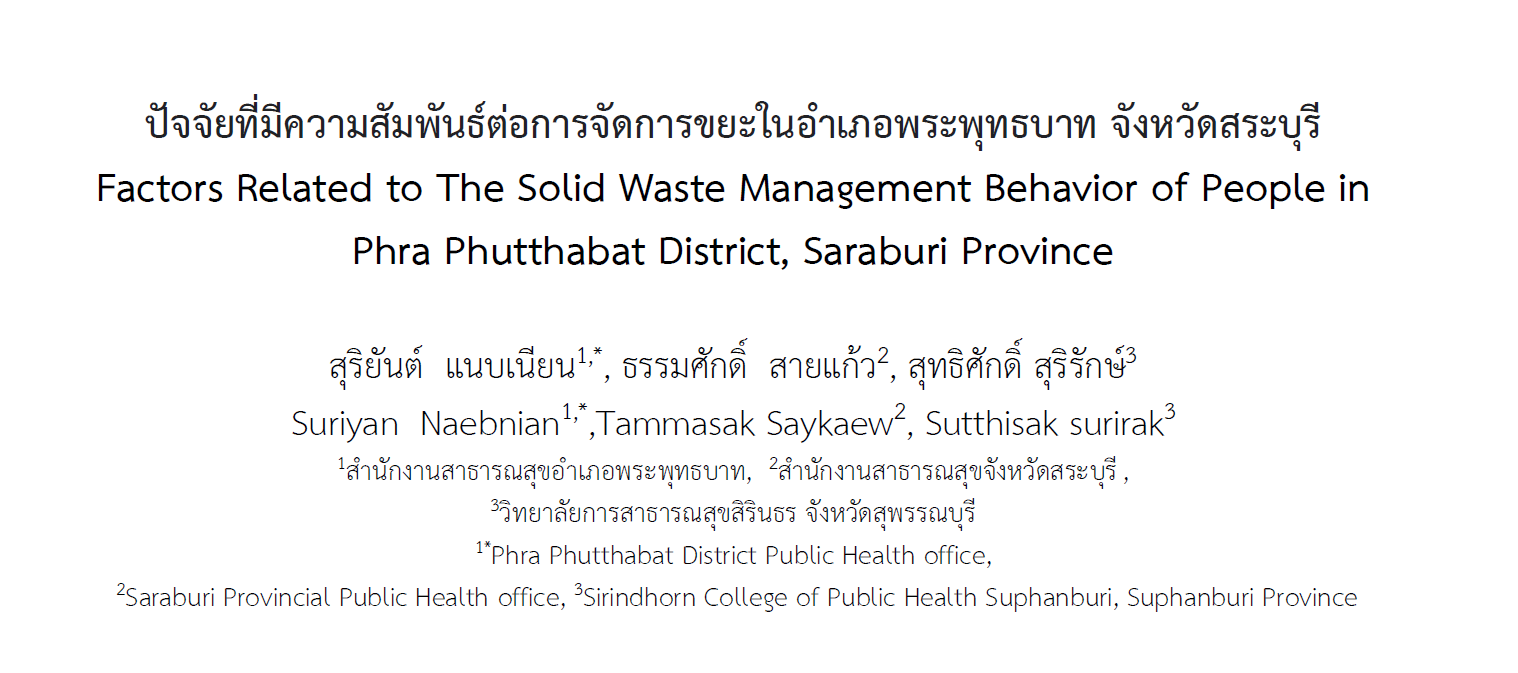ปัจจัยที่มีความสัมพันธ์กับการจัดการขยะมูลฝอยของประชาชนในอำเภอพระพุทธบาท จังหวัดสระบุรี
คำสำคัญ:
ปัจจัย, การจัดการขยะมูลฝอย, ประชาชนบทคัดย่อ
การวิจัยครั้งนี้เป็นการวิจัยเชิงพรรณนา (Descriptive Research) มีวัตถุประสงค์เพื่อศึกษาพฤติกรรมและปัจจัยที่มีความสัมพันธ์กับพฤติกรรมการจัดการขยะมูลฝอยของประชาชนในอำเภอพระพุทธบาท จังหวัดสระบุรี กลุ่มตัวอย่าง ได้แก่ ประชาชนตัวแทนครัวเรือนหรือผู้ที่อาศัยอยู่ในครัวเรือนในอำเภอพระพุทธบาท จังหวัดสระบุรี จำนวน 410 คน เก็บรวบรวมข้อมูลโดยใช้แบบสอบถาม วิเคราะห์ข้อมูลทั่วไปโดยการแจกแจงความถี่ และหาค่าร้อยละ วิเคราะห์ข้อมูลด้วยสถิติเชิงพรรณนา สถิติไคล์สแคว์ และสถิติสัมประสิทธิ์สัมพันธ์ของเพียร์สัน ผลการวิจัยพบว่า กลุ่มตัวอย่างส่วนใหญ่มีพฤติกรรมการจัดการขยะของกลุ่มตัวอย่างโดยรวมอยู่ในระดับต่ำ (M = 1.64 S.D.= 0.45 ) และรายด้าน พบว่า ส่วนใหญ่มีพฤติกรรมการจัดการขยะด้านการนำกลับมาใช้ซ้ำอยู่ในระดับปานกลาง (M = 1.88 S.D.= 0.41) รองลงมาด้านการนำกลับมาใช้ใหม่อยู่ในระดับต่ำ (M = 1.66 S.D.= 0.55) ในขณะที่ด้านการลดปริมาณขยะอยู่ในระดับต่ำ (M = 1.57 S.D.= 0.67) นอกจากนี้ ระดับความรู้เกี่ยวกับการจัดการขยะมูลฝอยในครัวเรือนโดยภาพรวมอยู่ในระดับปานกลาง (M = 7.49 S.D.= 1.36 ) ทัศนคติเกี่ยวกับการจัดการขยะมูลฝอยในครัวเรือนโดยรวมอยู่ในระดับดี (M = 3.68 S.D.= 0.77 ) และการมีส่วนร่วมจัดการขยะมูลฝอยในครัวเรือนโดยรวม อยู่ในระดับปานกลาง (M = 3.44 S.D.= 1.28 )
ปัจจัยที่มีความสัมพันธ์กับพฤติกรรมการจัดการขยะมูลฝอยของประชาชน พบว่า จำนวนสมาชิกครัวเรือน ทัศนคติเกี่ยวกับการจัดการขยะมูลฝอยในครัวเรือน และการมีส่วนร่วมในการจัดการขยะมูลฝอยในครัวเรือน มีความสัมพันธ์กับพฤติกรรมการจัดการขยะมูลฝอยของประชาชนอย่างมีนัยสำคัญทางสถิติ (p-value = < 0.001, 0.019 และ <0.001 ตามลำดับ) และ ค่าสัมประสิทธิสัมพันธ์(r) มีค่าเท่ากับ 0.200, 0.116 และ 0.096 ตามลำดับ ดังนั้นหน่วยงานที่เกี่ยวข้องควรรณรงค์ให้ประชาชนนำขยะกลับมาใช้ใหม่ (Recycle) ลดการสร้างคาร์บอนในบรรยากาศ หรือคาร์บอนฟุตพริ้นท์ (Carbon Footprint) และอบรมเชิงปฏิบัติการจัดการคัดแยกขยะก่อนทิ้ง รวมถึงการนำมาใช้ประโยชน์ใหม่ ด้วยกระบวนการเรียนรู้อย่างส่วนร่วม (PL : Participatory Learning ) จากบุคคลต้นแบบด้านการจัดการขยะครัวเรือน
เอกสารอ้างอิง
กรมควบคุมมลพิษ กระทรวงทรัพยากรธรรมชาติและสิ่งแวดล้อม.(2554) การจัดการขยะมูลฝอยชุมชนอย่างครบวงจร (พิมพ์ครั้งที่4). กรุงเทพมหานคร: โรงพิมพ์ครุสภาลาดพร้าว.
กองจัดการกากของเสียและสารอันตราย กรมควบคุมมลพิษ กระทรวงทรัพยากรธรรมชาติและสิ่งแวดล้อม. (2565).รายงานสถานการณ์สถานที่กำ จัดขยะมูลฝอยชุมชน ของประเทศไทย ปี พ.ศ. 2565.
เฉลิมพล ศรีวิบูลย.(2566). ปัจจัยทัศนคติที่มีผลต่อการกำจัดขยะมูลฝอยในครัวเรือนของประชาชนเทศบาลตำบลโพธิ์ไชย อำเภอโคกโพธิ์ไชย จังหวัดขอนแก่น (ปริญญานิพนธ์ปริญญารัฐประศาสนศาสตรมหาบัณฑิต), มหาวิทยาลัยราชภัฏมหาสารคาม. มหาสารคาม.
ทิวากรณ์ ราชธร, อเนก ศรีสุวรรณ, นรา ระวาดชัย, พัชรี ศรีกุตา และ Sim Samphors. (2566). ปัจจัยที่มีผลต่อพฤติกรรมการจัดการขยะมูลฝอยในครัวเรือนของประชาชน จังหวัดนคราชสีมา. วารสารวิทยาศาสตร์สุขภาพแห่งประเทศไทย,5(1),72-80.
ศราวุฒิ ทับผดุง และ จักรพันธ์ เพ็ชรภูมิ.( 2565 ).ปัจจัยที่มีผลต่อพฤติกรรมการลดปริมาณขยะมูลฝอยครัวเรือน ในเขตองค์การบริหารส่วนตำบลที่ไม่มีการบริหารจัดการขยะมูลฝอย อำเภอเมือง จังหวัดพิษณุโลก.วารสารเครือข่ายวิทยาลัยพยาบาลและการสาธารณสุขภาคใต้, 9(3), 86-97.
สถาบันวิจัยสภาวะแวดล้อม จุฬาลงกรณ์มหาวิทยาลัย. (2566) รายงานการศึกษาฉบับสมบูรณ์ โครงการศึกษาเพื่อจัดทำนโยบายสาธารณะปฏิรูประบบการจัดการขยะ และส่งเสริมเศรษฐกิจหมุนเวียน (ระยะที่ 2)
สำนักงานนโยบายและแผนทรัพยากรธรรมชาติและสิ่งแวดล้อม.(2565). รายงานสถานการณ์คุณภาพสิ่งแวดล้อม (พิมพ์ครั้งที่ 1). กรุงเทพฯ: บริษัท หนึ่งเก้าสองเก้า จำกัด.
สุจิตรา มูลวัต, เสาวลักษณ์ นิกรพิทยา และ วัชรินทร์สุทธิศัย. (2565, มิถุนายน). ปัจจัยทัศนคติที่มีผลต่อการกำจัดขยะมูลฝอยในครัวเรือนของประชาชนเทศบาล ตำบลโพธิ์ไชย อำเภอโคกโพธิ์ไชย จังหวัดขอนแก่น. Journal of Modern Learning Development, 8 (6).
Adzawla, W., Tahidu, A., Mustapha, S., & Azumah, S. B. (2019). Do socioeconomic factors influence households’ solid waste disposal systems Evidence from Ghana. Waste Management & Research, 37(1), 51–57.
Bloom, Benjamin S.,et al. (1971). Handbook on Formative and Summative Evaluation of Student Learning. New York: Mc Graw-Hill Book Company
Daniel, W. W. (1987). Biostatistics: a Foundation for Analysis in the Health Sciences (4th ed.). New York: John Wiley & Sons.
Kiess, H. O. (1989). Statistical concepts for the behavioral sciences. Needham Heights, MA, US: Allyn & Bacon

ดาวน์โหลด
เผยแพร่แล้ว
รูปแบบการอ้างอิง
ฉบับ
ประเภทบทความ
สัญญาอนุญาต
ลิขสิทธิ์ (c) 2024 วารสารนวัตกรรมสุขภาพและความปลอดภัย

อนุญาตภายใต้เงื่อนไข Creative Commons Attribution-NonCommercial-NoDerivatives 4.0 International License.
1. บทความหรือข้อคิดเห็นใด ๆ ที่ปรากฏในวารสารนวัตกรรมสุขภาพและความปลอดภัย ที่เป็นวรรณกรรมของผู้เขียน บรรณาธิการ ไม่จำเป็นต้องเห็นด้วย
2. บทความที่ได้รับการตีพิมพ์ถือเป็นลิขสิทธิ์ของ วารสารนวัตกรรมสุขภาพและความปลอดภัย






